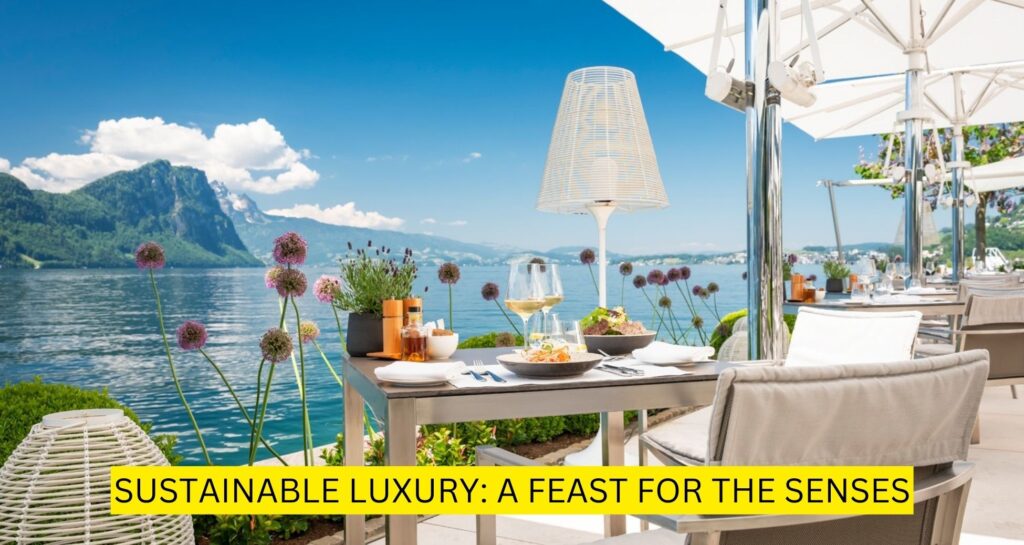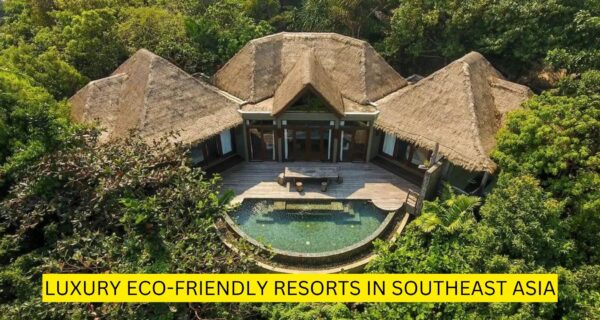In the lush landscapes of Southeast Asia, a revolutionary concept has taken root – luxury eco-friendly resorts. Far beyond the conventional bounds of hospitality, these establishments embody a fusion of opulence and environmental responsibility. This article embarks on an exploration of this burgeoning trend, uncovering the distinctive features and ethos that define luxury eco-friendly resorts in this enchanting region.
The hospitality industry in Southeast Asia is undergoing a transformative shift, pivoting towards sustainability. Luxury eco-friendly resorts are at the forefront of this movement, reshaping traditional notions of luxury travel. Their commitment extends beyond providing extraordinary guest experiences; they are dedicated to minimizing their ecological impact, ensuring that each visit leaves a positive mark on the environment.
As the demand for responsible tourism grows, these resorts have become champions of environmental stewardship. Collaborating with local conservation organizations, they actively contribute to wildlife preservation, ecosystem restoration, and community engagement. From supporting sea turtle conservation projects to initiating mangrove reforestation efforts, these establishments are not merely accommodation providers but integral components of the region’s conservation endeavors.
Environmental Stewardship

Conservation Efforts
In the relentless pursuit of sustainable luxury, luxury eco-friendly resorts in Southeast Asia stand out for their unwavering commitment to conservation. Beyond the allure of pristine landscapes, these establishments actively engage in initiatives that safeguard the region’s biodiversity. Rainforest Bliss Lodge in Langkawi, Malaysia, exemplifies this commitment by championing rainforest preservation and participating in wildlife rehabilitation programs. By creating a symbiotic relationship with the local environment, these resorts ensure that guests become partners in the preservation of Southeast Asia’s natural treasures.
The dedication to conservation extends to coastal areas, with resorts like SustainSerenity Retreat in Palawan, Philippines, spearheading coastal clean-up campaigns and providing support to indigenous communities. Such initiatives not only contribute to environmental preservation but also empower local populations, fostering a sustainable coexistence between luxury hospitality and community well-being.
As these resorts continue to redefine hospitality, their role as catalysts for positive change becomes increasingly evident. By aligning with and actively participating in conservation efforts, luxury eco-friendly resorts in Southeast Asia are rewriting the narrative of tourism, emphasizing the importance of responsible and immersive experiences.
Green Architecture
The allure of luxury eco-friendly resorts goes beyond their commitment to conservation; it extends to the very structures that house these experiences. Bamboo structures, solar-powered facilities, and rainwater harvesting systems exemplify the innovative green architecture that sets these resorts apart. Greenhaven Resort in Phuket, Thailand, for instance, seamlessly integrates solar-powered facilities into its infrastructure, not just as a sustainable choice but as a commitment to harnessing the region’s abundant natural resources.
In embracing such architectural innovations, these resorts not only reduce their environmental impact but also showcase the possibilities of harmonizing luxury with eco-friendliness. Guests find themselves ensconced in structures that complement the natural surroundings, fostering a deeper connection with the environment. As travelers increasingly seek immersive experiences that align with their values, the innovative green architecture of these resorts becomes a compelling draw, promising a stay that resonates with the principles of sustainability.
Unveiling Southeast Asia’s Hidden Gems

Exquisite Locations
Luxury eco-friendly resorts in Southeast Asia are strategically positioned in some of the most exquisite and pristine locations, providing guests with an immersive experience of nature’s grandeur. EcoParadise Retreat in Bali, Indonesia, is a testament to this, nestled amidst lush landscapes and offering bamboo villas that blend seamlessly with the surrounding environment. The location itself becomes an integral part of the luxury experience, with each resort serving as a gateway to the region’s hidden gems.
The allure of these locations extends beyond visual aesthetics; they serve as a backdrop for a myriad of unique experiences. Guests can embark on guided eco-tours through rainforests, discover secluded beaches, or simply revel in the panoramic views of mountains. The deliberate choice of these locations underscores a commitment to providing not just luxury but a holistic escape that rejuvenates the soul and reconnects individuals with the wonders of nature.
Luxury eco-friendly resorts in Southeast Asia go beyond merely providing a place to stay; they curate an immersive environment that becomes an integral part of the overall guest experience. As travelers increasingly seek authenticity and meaningful connections with the places they visit, these resorts emerge as gatekeepers to Southeast Asia’s hidden treasures.
Unique Cultural Experiences
Beyond their commitment to environmental preservation, luxury eco-friendly resorts in Southeast Asia offer a cultural tapestry that enriches the overall guest experience. These resorts serve as gateways to the rich heritage of the region, providing guests with opportunities to engage with local communities and traditions. Unique cultural experiences, such as traditional performances and artisanal workshops, become a focal point, allowing guests to delve into the heart and soul of Southeast Asia.
SustainSerenity Retreat in Palawan, Philippines, stands out for its efforts in supporting indigenous communities. By incorporating traditional performances and workshops, guests not only witness the cultural richness of the region but actively contribute to the preservation of indigenous heritage. This commitment to cultural sustainability transforms a stay at these resorts into an educational and enriching experience, fostering a deeper understanding and appreciation for the communities that call Southeast Asia home.
The integration of unique cultural experiences into the fabric of luxury eco-friendly resorts further distinguishes them in the realm of hospitality. As travelers seek not only luxury but also a connection with the authentic essence of a destination, these resorts become conduits for cultural exploration and understanding.
Sustainable Luxury: A Feast for the Senses

Culinary Delights
Sustainability extends to every aspect of the luxury eco-friendly resort experience, including culinary offerings that tantalize the taste buds while championing responsible practices. Farm-to-table dining emerges as a hallmark, with resorts like EcoParadise Retreat in Bali, Indonesia, sourcing ingredients locally to support nearby communities and reduce the carbon footprint associated with food transportation. The result is a culinary journey that not only satisfies gastronomic desires but also aligns with the principles of sustainability.
The emphasis on farm-to-table dining is not merely a trend but a conscious choice to support local farmers and promote sustainable agriculture. Guests partake in meals that showcase the flavors of the region while contributing to the well-being of local communities. As the culinary landscape of luxury eco-friendly resorts evolves, it becomes a testament to the marriage of indulgence and responsibility, redefining what it means to savor the finest flavors sustainably.
Spa and Wellness
Luxury and well-being intertwine seamlessly at eco-friendly resorts in Southeast Asia, with spa and wellness programs designed to pamper the senses while adhering to sustainable principles. Rainforest Bliss Lodge in Langkawi, Malaysia, exemplifies this commitment by incorporating locally sourced, organic products into its spa treatments. Guests are treated to rejuvenating experiences that not only enhance their well-being but also contribute to the preservation of natural resources.
The spa and wellness programs at these resorts extend beyond traditional offerings, often incorporating yoga sessions amidst natural surroundings. This holistic approach not only promotes physical health but also nurtures mental and emotional well-being. As travelers seek retreats that prioritize overall wellness, luxury eco-friendly resorts in Southeast Asia emerge as havens that cater to the complete rejuvenation of mind, body, and spirit.
Key Takeaways
- A Paradigm Shift in Hospitality: Luxury eco-friendly resorts in Southeast Asia redefine luxury travel by seamlessly integrating opulence with environmental consciousness, setting new standards for responsible tourism.
- Environmental Stewardship: These resorts actively engage in conservation efforts, partnering with local organizations and participating in initiatives such as rainforest preservation, wildlife rehabilitation, and coastal clean-up campaigns. Their dedication to sustainability extends beyond rhetoric, making them instrumental in the preservation of the region’s natural wonders. Guests not only enjoy a luxurious stay but also actively contribute to the ongoing efforts to protect Southeast Asia’s diverse ecosystems.
- Green Architecture: The innovative green architecture of luxury eco-friendly resorts is a testament to their commitment to minimizing environmental impact. Bamboo structures, solar-powered facilities, and rainwater harvesting systems exemplify their dedication to harmonizing with nature. This goes beyond aesthetics, as guests find themselves surrounded by structures that not only offer luxury but also showcase the potential for sustainable living. The resorts’ architectural choices become educational, inspiring visitors to reconsider the environmental impact of their own living spaces.
- Exquisite Locations: Luxury eco-friendly resorts strategically position themselves in breathtaking locations, providing guests with more than just a place to stay. EcoParadise Retreat in Bali, Indonesia, with its bamboo villas immersed in lush landscapes, exemplifies this deliberate choice. The locations serve as an extension of the overall experience, fostering a deeper connection with nature. Guests are not mere spectators; they become active participants in the preservation of Southeast Asia’s hidden gems, supporting the regions they visit.
- Unique Cultural Experiences: The integration of unique cultural experiences into the fabric of luxury eco-friendly resorts transforms a stay into a cultural immersion. Beyond providing luxurious accommodations, these resorts actively support and engage with local communities. From traditional performances to artisanal workshops, guests gain insights into the rich heritage of Southeast Asia. This commitment to cultural sustainability enhances the overall guest experience, making each visit not only luxurious but also culturally enriching.
- Culinary Delights: Sustainability extends to the dining experience at luxury eco-friendly resorts, where farm-to-table dining takes center stage. Resorts like EcoParadise Retreat in Bali, Indonesia, showcase a commitment to sourcing locally, supporting nearby communities, and reducing the carbon footprint associated with food. Guests embark on a culinary journey that not only satisfies their palate but also aligns with the principles of sustainable and responsible dining. The emphasis on locally sourced ingredients serves as a model for sustainable food practices in the broader hospitality industry.
- Spa and Wellness: The wellness programs at luxury eco-friendly resorts go beyond the conventional, incorporating sustainable practices into spa treatments. Rainforest Bliss Lodge in Langkawi, Malaysia, stands out for using locally sourced, organic products, providing guests with rejuvenating experiences that also contribute to environmental conservation. The integration of yoga sessions amidst natural surroundings further aligns with the resorts’ commitment to holistic well-being. As wellness becomes an integral aspect of travel, these resorts emerge as pioneers in offering not just indulgence but a complete rejuvenation of mind, body, and spirit.
A Table of Sustainable Luxury
| Resort Name | Location | Conservation Initiatives | Unique Features |
|---|---|---|---|
| EcoParadise Retreat | Bali, Indonesia | Mangrove reforestation, sea turtle conservation | Bamboo villas, organic farm-to-table dining |
| GreenHaven Resort | Phuket, Thailand | Coral reef protection, marine life education programs | Solar-powered facilities, underwater dining |
| Rainforest Bliss Lodge | Langkawi, Malaysia | Rainforest preservation, wildlife rehabilitation | Treehouse accommodations, guided eco-tours |
| SustainSerenity Retreat | Palawan, Philippines | Coastal clean-up campaigns, indigenous community support | Sustainable seafood dining, traditional performances |
Conclusion
In conclusion, the rise of luxury eco-friendly resorts in Southeast Asia represents a harmonious convergence of opulence and environmental responsibility. From their dedication to conservation and innovative green architecture to the unique cultural experiences they offer, these resorts redefine luxury travel. Guests are not just patrons; they become active contributors to sustainable practices, leaving an indelible mark on the preservation of the region’s natural wonders. As the demand for responsible tourism continues to grow, these resorts stand as beacons, illuminating the path toward a more conscious and fulfilling way to experience the beauty of Southeast Asia.
